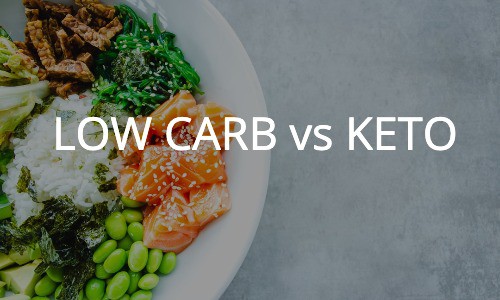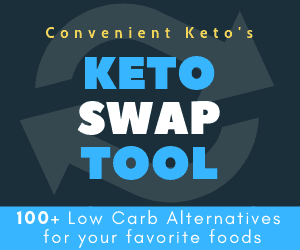Low carb and keto diets may appear to be essentially the same thing, but they are definitely not. If you’re trying to lose weight on keto, it’s important to understand the key differences in low carb vs keto diets.
In this article, we address:
- The role of fat (and specific types of fat) in low carb diets
- Why protein is so important, yet often overlooked
- What mistakes you could be making on both keto and low carb diets
To start, do any of the following questions ring true? If so, you’ll want to keep reading.
- Are you doing everything right but not in ketosis?
- Are you eating low carb but not in ketosis? Or, why is my body not going into ketosis?
- Are you in ketosis but not losing weight?
There’s No “I” in Keto
That’s “I” as in insulin.
If there’s one thing to take away, it’s that the keto diet is actually a low insulin diet. Insulin inhibits the generation of ketones in your body, so keeping insulin levels low is key.
Blood glucose UP = Insulin UP = Ketogenesis DOWN
Since most carbs cause an increase in blood glucose levels in the body, this in turn spikes insulin levels. These increased insulin levels lead to a decrease in ketone generation in the body.
This is why the keto diet is a low carb diet.
But low carb diets, like the name implies, only are concerned with the carb content. The keto diet, on the other hand, is a more specific version of a low carb diet that also calls for high fat and moderate protein intake.
We’ll get to protein in a sec, but let’s first focus on the F word, fat.
The Fat Fallacy
Most low carb diets don’t provide guidelines for fat intake. Keto is regarded as a high fat diet. That’s because when you eat a low glycemic diet, fat is used as fuel and can be converted to ketones to be utilized as energy.
And, yes, pure fat is non-glycemic and non-insulinogenic. However, as you can imagine, not all fat is created equal.
When most people increase their fat intake, they simply increase their fat intake across the board– polyunsaturated, saturated, monounsaturated. We all have heard about trans fats vs saturated fats. Most people consider trans fats bad and saturated fats are coming back in favor.
We won’t go into all the various types of fat in this article, but we want to focus on what will help your keto efforts, medium-chain saturated fats.
Medium Chain Triglycerides
Medium Chain Triglycerides (MCTs) are converted to ketones in your body quickly after consumption. That means you can have a high level of ketones in your body, which technically is considered to be a state of nutritional ketosis. However, these ketones came from the fat you ingested not the fat that’s stored in your body. This is part of the reason why you might technically be in ketosis but not losing weight.
Chasing the state of “ketosis” is really only important if you want to ensure that you consistently have ketones to run on, since ketones can be utilized by the brain for energy. This will keep you generally more alert and has therapeutic uses as well.
But, it’s not as critical as people make you believe when it comes to actual weight loss (this is why no one markets MCT oil and exogenous ketones as weight loss supplements–or, at least they shouldn’t)
Once we learn about protein’s role, we can show you how to address how to optimize keto for weight loss.
The Protein Paradox
Most of us know that not all fats are created equal, but did you know that not all protein is created equal either?
Remember our formula from above?
Blood glucose UP = Insulin UP = Ketogenesis DOWN
Well, blood glucose isn’t the only thing that stimulates insulin. What else might cause an increase in blood insulin levels?
You guessed it–protein.
Proteins are made up of building blocks called amino acids. Different sources of protein are made up of different amino acids. And, different amino acids have varying effects on insulin in the body.
Protein UP = Insulin UP = Ketogenesis DOWN
People don’t usually make this connection because protein doesn’t always spike blood glucose and when it does, it is often delayed for hours after a meal.
So then, the question is how to eat less protein on keto.
- Increase your fat intake to keep you satiated. This fat should come mainly from MCTs.
- Decrease animal-based protein like meat and dairy. These types of protein tend to have the most insulinogenic effect in the body. Also, animal-based fats are longer chain and the excess can be stored as body fat.
Find out more details on protein in our comprehensive keto protein post.
How weight loss works on the keto diet
The point is to use fat as fuel– whether that fat is from your diet or from your waistline. The maximize ketosis, you want to keep your insulin levels low. To do that, strive to eat low carb and low protein. By keeping insulin low and blood sugar low as much as possible, you reduce the amount of free blood glucose and also stored glucose.
Yes, your body stores excess glucose in your body in a form known as glycogen and when it’s low on energy and has glycogen available, it will break down the glycogen, releasing glucose into your blood stream, inhibiting ketogenesis and fat loss.
By keeping your insulin and blood glucose levels low, you will rely on your stored fat for fuel when you’re not eating (like while you sleep and in between meals). This is what you want to do to optimize weight loss on keto.
This is exactly why a low carb diet, that doesn’t focus fat and protein intake can falter:
- You can eat too much of the wrong types of fat while simultaneously spiking your insulin via too much protein, leading to fat storage and also a decrease in fat burn.
- Too much protein can spike your insulin levels to a point where the protein eventually get converted to glucose and gets stored in your body as glycogen.
- Likewise the delayed effect of protein on insulin in the body can make it so that you are constantly insulin-elevated, and therefore low in ketogenesis. You may want to think twice about that bedtime low carb protein snack.
Low Carb vs Keto Diet Key Points
Let’s put it all together.
- The keto diet is a low carb diet, but a low carb diet isn’t necessarily keto.
- Weight loss stalls are likely due to 2 main reasons:
- Too much protein intake in general
- Too much fat intake of the wrong type
- Think of MCT oil as a brain-body supplement for sustained energy while eating low carb and low protein. If you use MCT to replace longer chain fats, which can be stored as fat in the body, this will also help your weight loss efforts.
Okay, that’s it for our low carb vs keto discussion. Did this help clear up how keto is different from low carb?
Thanh Vo, MSc
Related posts
5 Comments
Leave a Reply Cancel reply
Howdy!

Sonja & Thanh: foodies at heart, globetrotters and avid discoverers of keto, low carb and organic products. Based out of Austin, Texas, we scour the world for food options that fit our healthy, active lifestyles.
Learn more



You actually make it seem so easy along with your presentation but I find this topic to be actually one thing that I think I would never understand. It seems too complicated and very huge for me. I am looking forward to your subsequent publish, I will attempt to get the hang of it!
I like what you guys are up too. Such clever work and reporting! Carry on the excellent works guys I have incorporated you guys to my blogroll. I think it will improve the value of my web site :).
Magnificent beat ! I wish to apprentice while you amend your website, how could i subscribe for a blog site? The account aided me a acceptable deal. I had been tiny bit acquainted of this your broadcast offered bright clear concept
I like this blog very much so much great info .
I was wondering if you ever considered changing the page layout of your blog? Its very well written; I love what youve got to say. But maybe you could a little more in the way of content so people could connect with it better. Youve got an awful lot of text for only having 1 or two images. Maybe you could space it out better?